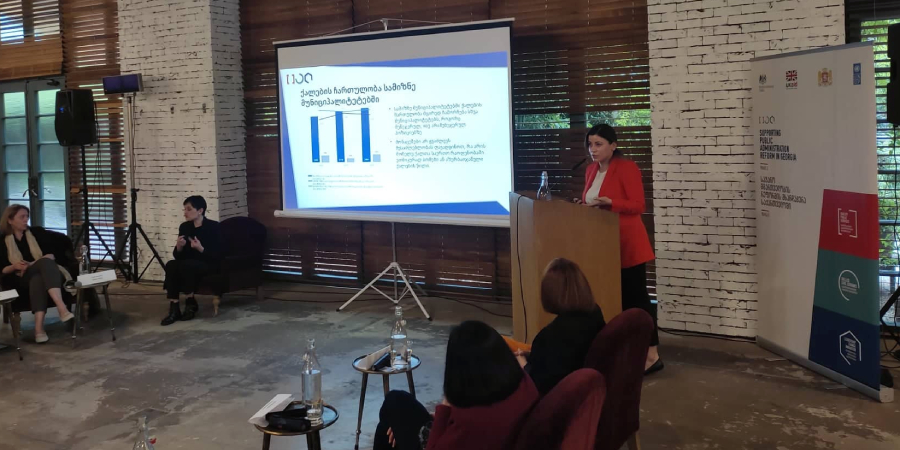Supporting Ethnic Minority Participation in the Civil Service


On May 3, we participated in an event entitled “Diversified and Inclusive Civil Service” and presented the findings of the “Taking Stock of Ethnic Minority Participation in the Public Service” research, aimed at assessing the representation of ethnic minorities, in particular Azeri- and Armenian-speaking groups in the civil service and identifying barriers that limit their active engagement in this sector.
Giorgi Khishtovani, Mariam Berianidze, Nikoloz Bakradze, Giorgi Tsulaia, and Maia Komakhidze co-authored the research, which was presented by Berianidze, Researcher at PMC Research Center, during the event. The study evaluated the practices of data collection on civil servants’ ethnic backgrounds in accordance with the relevant indicator under the Sustainable Development Goals (SDGs), and examined the perspectives of different stakeholders toward this issue.
According to the research, ethnic-minority civil servants consider their limited Georgian language skills to be one of their main challenges. However, it was found that insufficient knowledge of the Georgian language was less likely to present barriers to their employment or promotion in the civil service at municipal level, and that the importance of language skills only increases when civil servants want to advance their careers in the civil service at regional or national levels. Quantitative analysis also suggested that the engagement of ethnic-minority women, especially Azeri-speaking women, in the civil service remains a challenge. Furthermore, the research also assessed the effectiveness of state-funded initiatives, including the internship programs for ethnic minorities, and offered recommendations to increase the engagement of ethnic minority groups in the civil service, as well as recommendations for developing a unified methodology to collect data on ethnicity.
The event was organized as part of the project “Supporting Public Administration Reform (PAR) in Georgia, Phase 2,” implemented by the United Nations Development Programme with support from the UK government.
The UK government and UNDP, in partnership with the Civil Service Bureau of Georgia, worked together to study and analyze the legal and procedural gaps preventing people with disabilities (PwDs) and representatives of ethnic minorities from getting jobs and building careers in the public sector. In this regard, four studies were conducted with local experts and non-governmental organizations, all of which were presented at the event.
Catherine Kardava (Head of the Civil Service Bureau), Niko Tatulashvili (Advisor to the Prime Minister of Georgia on Human Rights Issues), Mikheil Sarjveladze (Chair of the Human Rights and Civil Integration Committee of the Parliament of Georgia), Anna Chernyshova (UNDP Deputy Resident Representative in Georgia), and Ellen Wichmann (Head of Programmes, Foreign, Commonwealth & Development Office, British Embassy in Georgia) all opened the event.
“A modern civil service is an open and diverse workspace that promotes and ensures equality and diversity. With the help of our research, the Georgian civil service will be able to better understand the needs of minorities and persons with disabilities and provide them with equal employment opportunities in the public sector,” said Anna Chernyshova, UNDP Deputy Resident Representative in Georgia.